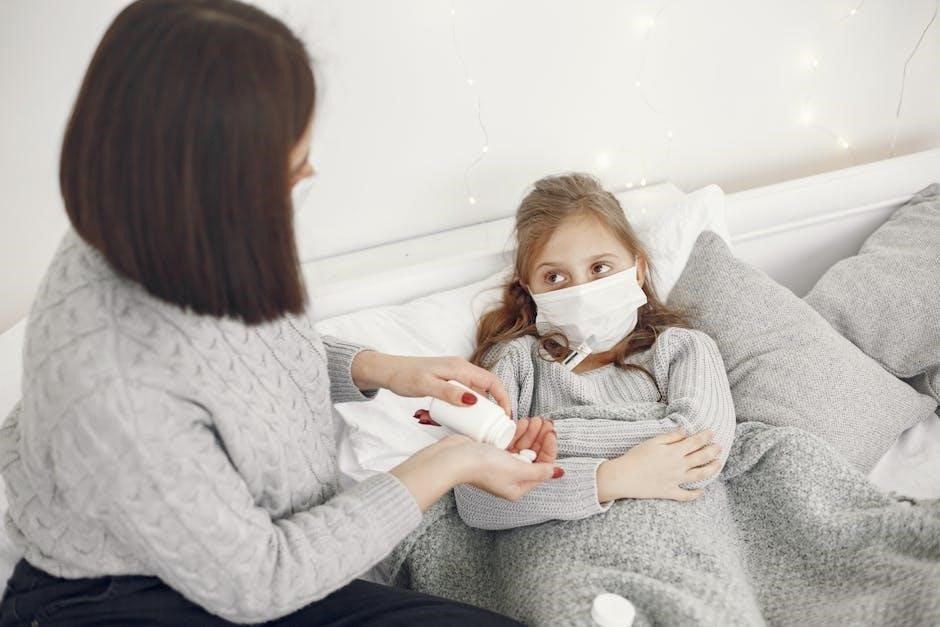A daycare sick policy ensures a healthy environment by guiding staff on handling illnesses, excluding sick children, and communicating with parents to prevent disease spread effectively․
Importance of a Sick Policy in Daycare Centers
A sick policy is essential for maintaining a healthy environment in daycare centers, preventing the spread of illnesses, and ensuring consistent care for sick children․ It provides clear guidelines for staff, helping them manage illnesses effectively without medical expertise․ The policy also sets expectations for parents, promoting cooperation and reducing confusion․ Without it, there could be inconsistent handling of sick children, risking exposure for others․ Additionally, it ensures legal compliance and protects the center from liabilities․ Ultimately, a sick policy fosters a safe, organized, and healthy setting for children and staff alike, crucial for smooth operations․
Key Objectives of a Daycare Sick Policy
The primary objectives of a daycare sick policy are to minimize the spread of illnesses, protect the health of children and staff, and ensure a safe environment․ It aims to provide clear guidelines for identifying and managing sick children, including exclusion criteria and communication protocols․ Additionally, it seeks to inform parents about their roles and responsibilities in caring for sick children․ The policy also ensures legal compliance with health regulations and maintains trust between families and the daycare center․ By achieving these goals, it supports a healthy and productive setting for all attendees․ Proper implementation ensures consistent and effective care practices․

Key Components of a Daycare Sick Policy
A daycare sick policy includes exclusion criteria, procedures for handling sick children, communication with parents, documentation of symptoms, and guidelines for preventing the spread of illness effectively․
Exclusion Criteria for Sick Children
Exclusion criteria ensure sick children stay home to prevent spreading illness․ Common criteria include fever (38°C+), vomiting, diarrhea, contagious diseases, or inability to participate in activities․ Children with symptoms requiring medical attention or those contagious to others are excluded․ Policies outline specific conditions, such as unexplained rashes or persistent coughs․ Parents must keep sick children home until symptoms resolve or a healthcare provider clears their return․ This ensures a healthier environment for all and aligns with local health regulations, balancing child well-being with community safety․ Proper documentation and communication with parents are essential for enforcement․
Procedures for Handling Sick Children
When a child becomes ill, staff isolate them from others to prevent spreading the illness․ Symptoms are documented, and parents/guardians are promptly notified․ The child must be picked up within a reasonable timeframe․ Staff monitor the child’s condition while ensuring hygiene practices, such as handwashing and disinfecting areas․ If the child’s temperature exceeds 38°C, immediate pickup is required․ A medical clearance may be needed before the child returns․ These steps ensure the child receives care while protecting others, maintaining a safe environment, and complying with health guidelines․ Proper communication and documentation are crucial throughout the process․
Communication with Parents and Guardians
Daycare centers must maintain clear communication with parents/guardians regarding their child’s health․ Staff promptly notify parents if a child shows symptoms of illness․ Detailed information about the child’s condition, including specific symptoms and any actions taken, is provided․ Parents are expected to arrange for their child to be picked up within a reasonable timeframe․ In cases of contagious illnesses, parents are informed to prevent further spread․ The daycare also provides resources for managing common illnesses and may require a medical clearance before the child’s return․ Regular updates ensure parents are informed and involved in their child’s care and recovery, fostering trust and cooperation․

Staff Responsibilities and Guidelines
Staff must monitor children’s health, enforce hygiene practices, isolate sick children, and document symptoms․ They ensure adherence to policies, maintaining a safe and healthy environment for all․
Identifying Symptoms of Illness in Children
Staff are trained to recognize common symptoms of illness, such as fever, cough, vomiting, diarrhea, rashes, or lethargy․ Behavioral changes, like irritability or lack of appetite, may also indicate sickness․ Monitoring children’s health daily helps early detection․ If symptoms persist or worsen, parents are notified promptly; Clear guidelines ensure staff can identify when a child’s condition requires exclusion or medical attention, protecting both the individual and the group from potential outbreaks․

Documentation and Reporting Requirements
Accurate documentation is essential for tracking illnesses and ensuring compliance with health regulations․ Staff must record symptoms, dates, and times of onset, along with actions taken, such as notifying parents․ Any exclusion due to illness must be documented, including the reason and duration․ Additionally, facilities must report outbreaks exceeding normal illness levels to local health departments․ Records are maintained confidentially, adhering to privacy laws․ This documentation helps prevent the spread of illness, supports parental communication, and ensures transparency in health management within the daycare setting while meeting legal obligations․

Preventing the Spread of Illness
Preventing illness spread involves strict hygiene practices, frequent disinfection, and proper ventilation․ Excluding sick children and promoting handwashing are key strategies to maintain a healthy daycare environment․
Hygiene Practices in Daycare Facilities
Hygiene practices are crucial in daycare facilities to minimize the spread of illnesses․ These include frequent handwashing with soap and water for at least 20 seconds, especially after using the restroom, before eating, and after coughing or sneezing․ Staff should ensure children wash hands regularly and use hand sanitizer when soap and water are unavailable․ Surfaces, toys, and utensils should be disinfected daily, paying attention to high-touch areas like doorknobs and light switches․ Proper hygiene training for both staff and children helps create a cleaner, healthier environment․
Isolation Procedures for Sick Children

Daycare facilities should have designated areas for isolating sick children to prevent the spread of illness․ These areas should be comfortable, supervised, and equipped with necessary supplies․ Staff must ensure the child remains separated from others until picked up․ Parents or guardians should be notified immediately, and the child should be kept calm and hydrated․ The isolation area must be cleaned and disinfected regularly․ Policies should align with local health guidelines to ensure proper handling of contagious illnesses and maintain a safe environment for all children and staff․

Legal and Regulatory Compliance
Daycare centers must adhere to state and federal health regulations, notify local health departments during outbreaks, and ensure policies comply with legal standards to maintain safety and accountability․
Local Health Department Notifications
Daycare facilities must notify local health departments when outbreaks of illness occur, especially if multiple children or staff exhibit similar symptoms․ This ensures timely public health interventions․ Specific criteria, such as a child’s fever exceeding 38°C or diagnosis of a contagious disease, often trigger mandatory reporting․ Parents must be informed promptly, and the sick child should be isolated to prevent further spread․ Documentation of symptoms and notification processes is essential for compliance․ Collaboration with health officials helps contain outbreaks and protects the broader community, aligning daycare operations with public health priorities and legal requirements․ Clear communication is vital in these situations․
Compliance with State and Federal Guidelines
Daycare centers must adhere to state and federal health regulations to ensure the safety and well-being of children․ These guidelines outline specific exclusion criteria for sick children, such as fever thresholds and contagious illnesses․ Staff training on infection control and proper hygiene practices is mandated․ Regular audits and policy updates are required to maintain compliance․ Failure to follow these guidelines can result in penalties or loss of licensure․ By aligning policies with state and federal standards, daycares create a safe and legal environment for children and staff, fostering trust and accountability within the community they serve․

Support for Families
Daycare sick policies provide backup care options and resources for families, ensuring parents can manage their child’s illness while maintaining work commitments effectively and responsibly․
Backup Care Options for Sick Children
Daycare sick policies often include backup care options to support families when their child is ill․ These options may involve in-home care services, trusted babysitters, or nearby childcare facilities that accept sick children․ Parents are encouraged to create a backup plan to ensure their child receives proper care while preventing the spread of illness․ Some daycare centers partner with local providers to offer discounted or priority access for sick care․ Having a reliable backup plan helps families maintain work commitments while ensuring their child’s well-being during recovery․
Resources for Managing Common Illnesses

Daycare sick policies often provide resources to help families manage common illnesses effectively․ These may include symptom guides, care manuals, and access to medical professionals․ Parents are encouraged to use these resources to understand when a child is too sick for daycare and how to care for them at home․ Some centers offer detailed documentation, such as “How Sick is Too Sick?” guides, to help families make informed decisions․ Additionally, partnerships with healthcare providers ensure families have access to expert advice and medical clearance for their child’s return to care․

Sample Daycare Sick Policy Template
This template outlines essential guidelines for managing illnesses in daycare settings․ It includes exclusion criteria, symptom monitoring, and communication protocols with parents․ The policy ensures staff are trained to identify symptoms like fever, vomiting, or rash, requiring immediate action․ Parents are notified promptly, and children are isolated until pickup․ The document also covers return-to-care procedures, such as medical clearance, to prevent disease spread․ Legal compliance and health department notifications are emphasized․ This template serves as a comprehensive framework for maintaining a healthy environment, ensuring safety for all children and staff while supporting families during illnesses․



